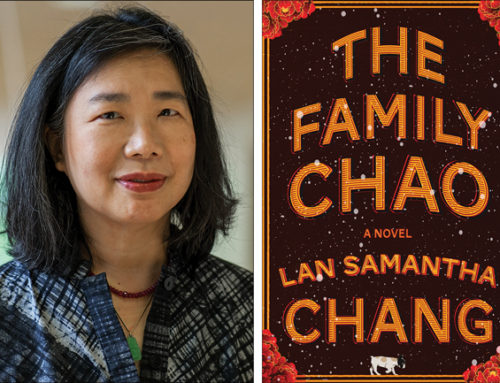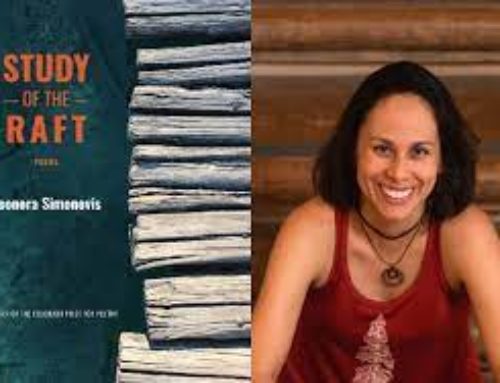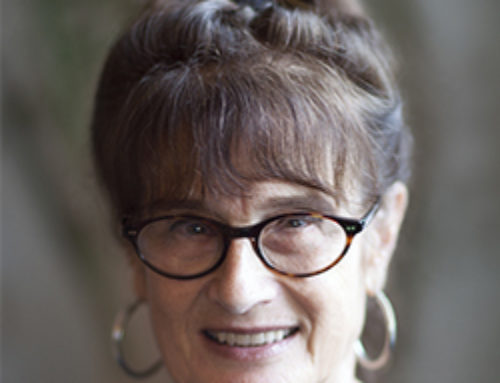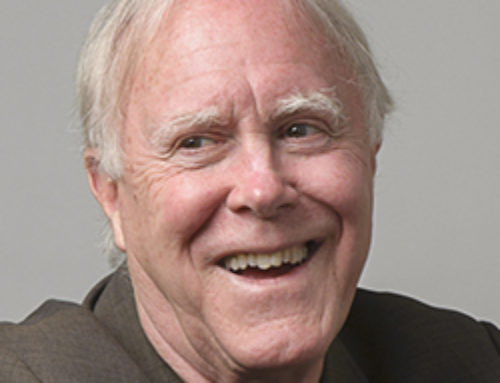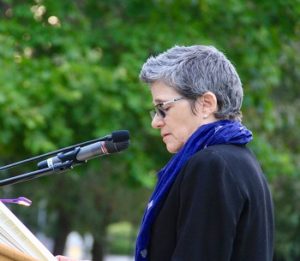 We were saddened to learn that 2018 faculty member Jane Mead died Sunday, September 8, 2019. Our poetry director, Iris Dunkle, Jane’s long-time friend and colleague, offers this remembrance.
We were saddened to learn that 2018 faculty member Jane Mead died Sunday, September 8, 2019. Our poetry director, Iris Dunkle, Jane’s long-time friend and colleague, offers this remembrance.
Up on the ridge at Jane Mead’s family vineyard above Napa you can see all the way to San Francisco. The silver thread of the Napa River weaves through the valley all the way to San Pablo Bay. The first day I visited her she’d taken me on a hike to this vista, her loyal dogs weaving in and out of our path, or cometing out ahead. As we walked, she advised me on my writing projects, and my impatience to finish them. She told me to slow down. Shrugging, she said, “What’s the rush? Let the work take the time it needs.” That day, the din of my mind shooed her words off. I was determined to muscle my way through my work.
When we returned from the ridge, she took me on a tour of the old barn, which contained a real stage coach, and then to the stone house, where chairs were draped in buffalo hides. She told me the stories of her grandfather, who’d built the house, and how she’d been drawn back to the land to run the vineyards that quilted the hillside after her father died in 2003. Through the picture windows that framed the view, hawks circling on thermals, the golden hills rolled forward, and a calm settled in. I began to think I could slow down.
Within an hour after our visit, I was back down in the Napa Valley, rushing to photocopy materials for my class at the junior college. Stress began its electric pulse through my veins and the peace I’d felt seemed to evaporate. But that’s the funny thing about places and people. They seep into you; they surround you like good soil.
Over the years, Jane continued to support me. We met for long lunches. We gave readings together at local bookshops. And every time we met, she’d ask if I’d given myself a break. If I’d slowed down. Slowly, her advice, like the clear lyrics she wrote, began to root in me.
Meanwhile, Jane’s work continued to receive the acclaim it deserved. Her stunning collection, World of Made and Unmade (2016), was a finalist for the Griffin Prize and the Los Angeles Times Book Award, and was longlisted for the National Book Award.
Then, in October 2017, Jane’s family home burned to the ground. She lost her family artifacts, her drafts and correspondence and her two beloved dogs in the quick and terrible blaze. Then she became sick, and just last Sunday, Jane Mead succumbed to her battle with cancer, only a few weeks after her long-awaited collection To the Wren: Collected and New Poems 1991-2019 was released by Alice James Books.
This past week, I’ve been trying to remember what it felt like to be in the presence of Jane and root myself in it. I’ve been trying to fight the erasure of reality and sickness and fire. To imagine walking slowly back up to the ridge on her family property, her dogs following us, and look out at the vista of all that she gave me, all that she gave us.
The World
by Jane Mead (from House of Poured Out Waters)
remaining central, there is
some knowledge we do not
debate: a child is born
to his body the day he is
born, for example, or
the sky’s felt time
seems like mourning:
the grasshoppers are anonymous
to the anonymous, the birds
are always at attendance.
There comes a moment
when you see as the crow sees:
the body as slaughterhouse,
as beggar—in the long grass, kneeling.
The Future
As a child, who you were
was located in the future—
Right? Now where is
your existence. In
there were dogs—
then we buried them?
Berries, so we put them
in jars? There were
guns, so we fired them
at one another, or didn’t—
Just as the scene was predicted?
Just as the act was forewritten.



